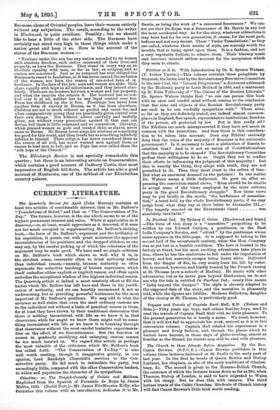CURRENT LITERATURE.
The Quarterly Review for April (John Murray) contains at least two articles of considerable interest, that on Mr. Balfour's "Foundations of Belief," and that on "The Conservatism of To- Day." The former, however, is the one which seems to us of the highest permanent interest and value. While it appreciates as it deserves,—or, at least, would appreciate as it deserved, if it were not too much occupied in supplementing Mr. Balfour's striking book,—the force of Mr. Balfour's argument and the brilliancy of his exposition, it points out with great acuteness the apparent inconsistencies of his positions, and the dropped stitches, as one may say, by the careful picking up of which the coherence of the argument may be made good. We have read no single criticism on Mr. Balfour's book which shows so well why it is, in the strictest sense, reasonable often to trust authority rather than individual reason,—namely, because authority so often represents the collective teaching of human experience, which itself embodies either explicit or implicit reason, and often again embodies the exceptional wisdom of the highest individual reason. The Quarterly article is indeed a most masterly effort to fill the hiatus which Mr. Balfour has left here and there in his justifi- cation of authority, and we can heartily recommend it not as undermining, but as providing powerful buttresses for the most important of Mr. Balfour's positions. We may add to what the reviewer so well states that even the most ordinary customs are to the individual not without a basis of practical reason in them, for at least they have shown by their traditional observance that there is nothing inconsistent with life as we know it in that observance, while for aught we know there might well be some- thing inconsistent with life as we know it in breaking through that observance without the most careful tentative experimenta- tion on the effect of its discontinuance. Bat the function of reason in gradually modifying and enlarging custom cannot be too much insisted on. We regard this article as perhaps the most valuable of the criticisms which Mr. Balfour's book has called forth. "The Conservatism of To-Day" is also well worth reading, though it exaggerates greatly, in our opinion, Lord Randolph Churchill's services to the Con- servative party. He did much to intimidate the party, but exceedingly little, compared with the other Conservative leaders, to widen and. popularise the character of its sympathies.






































 Previous page
Previous page